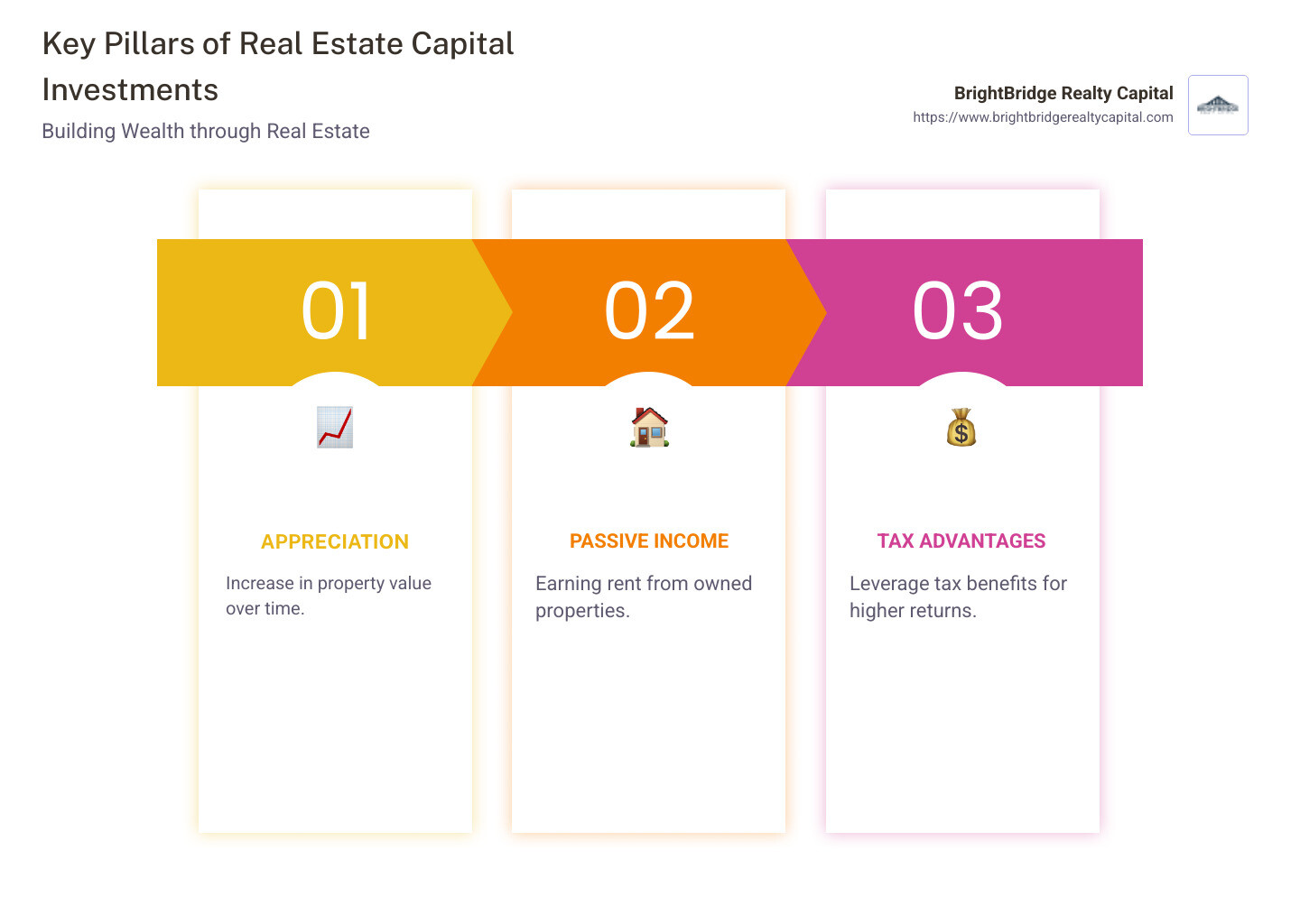Building Wealth: The Essentials of Real Estate Capital Investments

Real estate capital investments are powerful tools for building wealth. They provide opportunities to achieve financial growth through property value appreciation, passive rental income, and strategic tax advantages. For investors keen on expanding their portfolio with tangible assets, real estate capital investments often serve as a reliable and profitable vehicle.
When done wisely, real estate can diversify your investment portfolio and shield against market volatility. It stands as a robust option for wealth-building, particularly in a busy hub like New York, NY, where the property landscape is vibrant and dynamic.
To sum up the essentials of real estate capital investments:
- Real estate capital investments offer a mix of appreciation, income, and tax benefits.
- Investing involves both direct (buying property) and indirect avenues (like REITs).
- It's key to evaluate risk, market trends, and property types before diving in.
Every decision in real estate should align with your financial goals and risk tolerance.

Understanding Real Estate Capital Investments
Real estate capital investments come in two main flavors: direct investments and indirect investments. Each has its own set of benefits and challenges, making it essential to understand both before jumping in.
Direct Investments
In direct investments, you purchase physical property. This means you might buy a multifamily apartment building, an office space, or even a retail center. Direct ownership gives you control over the property, allowing you to make decisions about leasing, property management, and renovations.
Pros of Direct Investments:
- Control: You make the decisions.
- Tangible Asset: You own physical property.
- Potential for Higher Returns: If the property appreciates or generates high rental income.
Cons of Direct Investments:
- High Initial Capital: Buying property can be expensive.
- Management Responsibilities: You handle tenants and maintenance.
- Illiquidity: Selling property takes time.
Indirect Investments
Indirect investments involve putting money into real estate without owning the property directly. This is commonly done through Real Estate Investment Trusts (REITs) or private equity funds. These vehicles allow you to invest in real estate portfolios managed by professionals.
Pros of Indirect Investments:
- Lower Entry Cost: You can start with less money.
- Professional Management: Experts handle the properties.
- Liquidity: Easier to buy and sell than physical property.
Cons of Indirect Investments:
- Less Control: You rely on managers’ decisions.
- Market Volatility: REITs can be affected by stock market swings.
- Fees: Management fees can eat into returns.
Real Estate as an Asset Class
Real estate is a unique asset class. It offers diversification from traditional stocks and bonds, often providing a hedge against inflation. While stocks can be volatile, real estate tends to be more stable, offering consistent returns through rental income and property value appreciation.
Key Characteristics of Real Estate as an Asset Class:
- Stability: Less volatile than stocks.
- Income Generation: Through rents and leases.
- Appreciation Potential: Property values often rise over time.
When considering real estate capital investments, it's crucial to weigh the benefits and risks of direct versus indirect investments. Whether you're seeking control and tangible assets or prefer the ease and liquidity of REITs, understanding your investment style and goals will guide your choices.

Next, we'll dive into the benefits of real estate capital investments, exploring how they can offer tax advantages, passive income, and appreciation.
Benefits of Real Estate Capital Investments
Investing in real estate can be a powerful way to build wealth. Let's explore three key benefits: tax advantages, passive income, and appreciation. Each of these can significantly impact your financial future.
Tax Advantages
One of the biggest perks of real estate investing is the potential for tax benefits. Property owners can take advantage of deductions like mortgage interest, property taxes, and even depreciation.
- Depreciation: This allows you to deduct a portion of the property's value each year, lowering your taxable income.
- 1031 Exchange: A strategy that lets you defer capital gains taxes when selling a property and reinvesting the proceeds in a similar property.
These tax benefits can improve the overall return on your investment, making real estate a compelling option for those looking to optimize their tax situation.
Passive Income
Real estate is famous for generating passive income. Whether through residential or commercial properties, rental income can provide a steady cash flow.
- Consistent Cash Flow: Tenants pay rent, which can cover mortgage payments and other expenses, leaving you with a profit.
- Less Volatility: Compared to stocks, real estate income is generally more stable and predictable.
This passive income stream can be especially appealing for retirees or those seeking financial independence, offering a reliable source of funds without the day-to-day hustle.
Appreciation
Over time, real estate tends to increase in value, a phenomenon known as appreciation. This can result from factors like location development, market demand, and property improvements.
- Natural Appreciation: As demand for housing or commercial space grows, so does the value of the property.
- Forced Appreciation: By making improvements or upgrades, you can increase the property's value, potentially boosting your returns when you sell.
Appreciation not only improves the value of your asset but also contributes to your overall net worth, making real estate a valuable addition to any investment portfolio.
These benefits make real estate capital investments an attractive option for many investors. Next, we'll dig into the various types of real estate capital investments, including REITs, private equity, and multifamily properties.
Types of Real Estate Capital Investments
When it comes to real estate capital investments, there are several paths you can take. Let's explore three popular types: REITs, private equity, and multifamily properties.
Real Estate Investment Trusts (REITs)
REITs are companies that own, operate, or finance income-producing real estate. They offer a way for individuals to invest in large-scale properties without having to buy or manage them directly.
- Publicly Traded REITs: You can buy these on stock exchanges, making them easy to invest in and sell. They provide liquidity and accessibility like stocks.
- Private REITs: These are not traded on public exchanges and are usually available to accredited investors. They can offer less volatility but are typically less liquid.
REITs are required to distribute at least 90% of their taxable income as dividends, which can provide a steady income stream. This makes them a popular choice for those seeking regular income.

Private Equity
Private equity real estate involves investing in private funds that buy, improve, and sell properties. These investments are generally more hands-on and require a higher level of expertise and capital.
- Value Add Investments: These properties need improvements or renovations to increase their value and cash flow.
- Opportunistic Investments: High-risk, high-reward projects like new constructions or major redevelopments.
Private equity can offer higher returns compared to other real estate investments, but it also comes with higher risks and longer investment horizons.
Multifamily Properties
Investing directly in multifamily properties—like apartment buildings or condos—can be a great way to generate income and build equity.
- Steady Cash Flow: With multiple units, you have multiple income streams, which can help stabilize your cash flow.
- Economies of Scale: Managing multiple units in one location can reduce per-unit costs and increase profitability.
Multifamily properties are often considered a safer investment due to the constant demand for housing. They can also benefit from both rental income and property appreciation over time.
Understanding these different types of real estate capital investments can help you choose the right path based on your financial goals and risk tolerance. Next, we'll explore how to start investing in real estate capital, focusing on due diligence, investment strategies, and risk management.
How to Start Investing in Real Estate Capital
Starting your journey in real estate capital investments can seem daunting, but with the right approach, it can be straightforward and rewarding. Here’s how to get started:
Due Diligence
Before investing, it's crucial to do your homework. Due diligence means thoroughly researching and understanding the investment you’re considering.
Research the Market: Look into the overall real estate market conditions. Is it a buyer's market or a seller's market? Understanding these trends can help you make informed decisions.
Evaluate the Property: If you’re investing directly, inspect the property. Consider its location, condition, and potential for appreciation.
Check the Numbers: Analyze financial statements and projections. Look at expected cash flows, expenses, and potential returns. This is especially important for REITs and private equity investments.
Investment Strategies
Choosing the right investment strategy is key to success in real estate capital.
Diversification: Spread your investments across different types—such as REITs, private equity, and multifamily properties—to reduce risk. Diversification can help protect your portfolio from market fluctuations.
Long-Term Focus: Real estate is typically a long-term investment. Be prepared to hold your investments for several years to maximize returns.
Leverage Opportunities: Using leverage, or borrowed capital, can amplify your returns. However, it also increases risk, so use it wisely.
Risk Management
Managing risk is essential in any investment, and real estate is no exception.
Assess Risk Levels: Understand the risk involved with different types of investments. Core investments are generally lower risk, while opportunistic investments carry higher risk but offer higher potential returns.
Stay Informed: Keep up with market trends and economic indicators. Changes in interest rates, inflation, and local market conditions can impact your investments.
Have a Backup Plan: Always be prepared for unexpected events. This could mean having reserves set aside or exit strategies in place if things don’t go as planned.
By focusing on due diligence, crafting a solid investment strategy, and managing risk effectively, you can confidently start on your real estate investment journey. Next, we’ll tackle some frequently asked questions about real estate capital investments, such as tax benefits and choosing the right investment.
Frequently Asked Questions about Real Estate Capital Investments
What are the tax benefits of real estate investing?
Investing in real estate can offer several tax advantages that help improve your returns. One of the key benefits is the ability to deduct expenses related to property management, such as maintenance and repair costs, from your taxable income. Additionally, depreciation allows you to deduct the cost of the property over time, reducing taxable income even further.
Another advantage is the tax efficiency associated with capital gains. When you sell a property for more than you paid, the profit is typically taxed at a lower rate than regular income. Furthermore, if you reinvest the proceeds into another property using a 1031 exchange, you can defer paying capital gains taxes altogether.
How do I choose the right real estate investment?
Choosing the right investment involves a careful risk assessment and aligning with your investment goals. Start by determining your risk tolerance. Are you comfortable with higher risk for potentially higher returns, or do you prefer safer, more predictable investments?
Once you know your risk tolerance, set clear investment goals. Are you looking for steady passive income, or are you aiming for long-term appreciation? This will guide you in selecting the appropriate type of investment, whether it be residential properties for rental income or commercial properties for capital growth.
Additionally, consider the property's location, tenant quality, and market conditions. A well-located property with reliable tenants can offer more stable returns, while a property in a growing area might provide higher appreciation potential.
Is real estate crowdfunding a good investment?
Real estate crowdfunding is becoming increasingly popular, especially among beginner investors. It allows individuals to pool resources and invest in larger projects that might be out of reach individually. This can be a great way to diversify your portfolio without a significant upfront investment.
However, it's important to note that crowdfunding can be riskier than traditional real estate investments. Projects on crowdfunding platforms may not have secured traditional financing, indicating higher risk. Additionally, these investments are often illiquid, meaning your money could be tied up for several years.
For those willing to accept these risks, crowdfunding can offer attractive returns, with some platforms boasting annualized returns between 2% and 20%. As always, thorough due diligence is crucial before committing your funds.
With these insights, you're equipped to steer the tax benefits, investment choices, and opportunities in real estate crowdfunding. Next, we’ll explore how BrightBridge Realty Capital can help you achieve strategic growth in your real estate investments.
Conclusion
At BrightBridge Realty Capital, we’re committed to helping you achieve strategic growth in your real estate investments. Our expertise and custom financing solutions ensure that you can focus on maximizing investment returns while we handle the complexities of funding.
Our approach is simple: provide fast, flexible, and direct lending solutions that align with your unique investment strategy. Whether you're flipping properties, constructing new buildings, or expanding a rental portfolio, our nationwide reach and quick closing process—often within a week—ensure you never miss an opportunity.
We understand that every investor's journey is different. With our help, you can steer the challenges and seize the opportunities that real estate capital investments offer. From tax advantages to potential for appreciation, real estate remains a powerful asset class for building wealth.
If you're ready to take the next step in your investment journey, explore our services and see how BrightBridge Realty Capital can be your partner in success. Together, we can bridge the gap to your financial goals and drive strategic growth in your real estate ventures.


